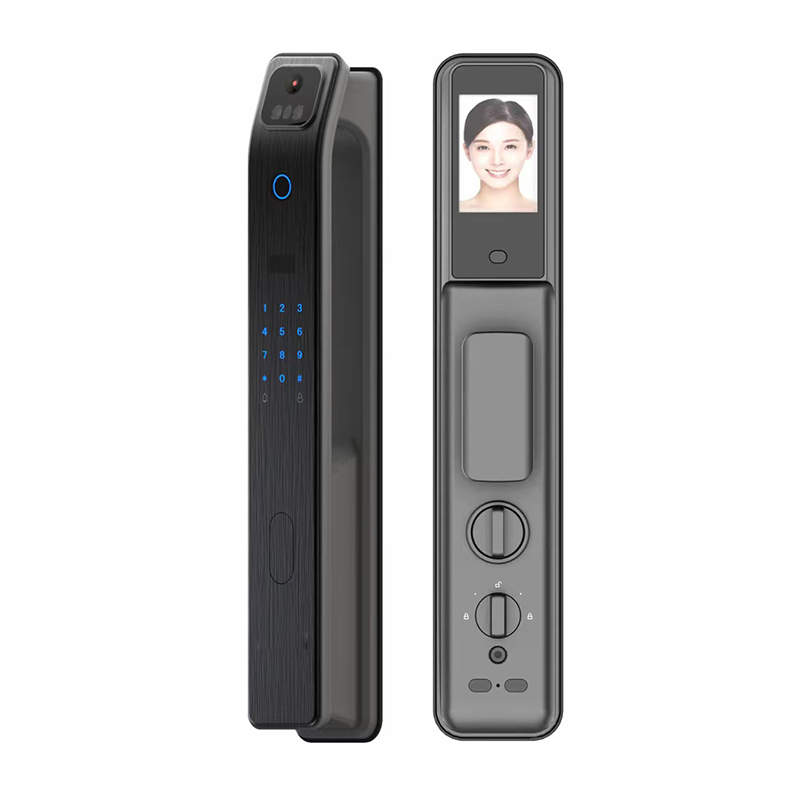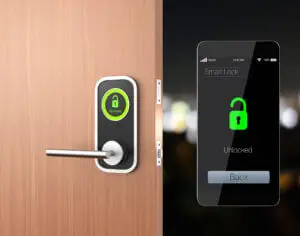As a lock manufacturing company, we have seen significant changes in the evolution of locks over the years. With technology advancing by leaps and bounds, commercial smart locks have become popular due to their convenience and enhanced security features.
If you’re considering purchasing a commercial smart lock, this ultimate FAQ guide will answer all your burning questions about these modern solutions.
What is a Commercial Smart Lock?
A commercial smart lock is an intelligent locking system that uses wireless communication to interact with other smart locks devices. This type of locking system can be remotely controlled using mobile device apps, key fobs, or voice assistance.
It also comes with various features like video surveillance, access control system integration, biometric recognition, and cloud capabilities to enhance security for commercial buildings like banks or hospitals.
What are the Different Types of Commercial Smart Locks Available?
There are many types of smart locks available on the market today. Some popular choices include:
- Keypad and Touchscreen – This type of smart lock uses a keypad or touchscreen that requires you to enter a code or swipe your hand across it.
- Biometric Locks – A biometric lock utilizes face recognition or fingerprint scanning to grant access.
- Key Fob Locks – Key fob locks use radio frequency identification (RFID) signals transmitted by a keychain gadget to unlock doors.
- Bluetooth and Wi-Fi-Enabled Locks – These types of locks connect through Bluetooth or Wi-Fi networks and can be accessed from your phone via apps.
- Smartcard – A smartcard is like an electronic ID card given to employees in offices where they can use it as an entry pass.
How Secure Are Commercial Smart Locks?
Commercial smart locks are highly secure as they come equipped with multiple security features, such as encryption protocols that protect them from hacking attempts.
Also, since they don’t require physical keys that can be easily copied – thus eliminating any theft risks – the chances of unauthorized access reduce significantly.
Smart locks allow for more robust authentication methods like PINs or biometric recognition, which prevent anyone else from gaining access to your building.

What are the Benefits of Using Commercial Smart Locks?
Using a commercial smart lock comes with many advantages, including:
Increased automation
Commercial smart locks can be controlled remotely via your mobile phone or other networked devices. You can create one-time or regular password access codes for clients or employees without having to physically interact with them at all times.
Reduced operational costs
With smart locking systems, you don’t have to worry about losing keys, so you eliminate the need for key duplication, which saves money in the long term.
Enhanced security
As mentioned earlier, smart locks come with advanced security features that make it more difficult for unauthorized individuals to gain access. The inclusion of biometric recognition adds an extra level of protection that key or card-entry systems cannot offer.
Convenience
Smart locks allow you to control your commercial doors from anywhere, at any time. For example, if you forget to lock your door while leaving home and realize it later, you can do so using an app on your mobile phone.
Customization
You can customize smart locks to meet specific needs through apps or other software solutions. If you need to change access permissions temporarily for a visitor, service provider, or employee who no longer works with your organization- a few clicks will suffice.
Do Commercial Smart Locks Have Backup Power Supplies?
Yes. Commercial smart locks have backup battery supplies that automatically activate during a power outage or if the primary battery runs out of charge. It ensures that the system continues functioning without interruption until power is restored.
Can Network Outages Affect My Smart Locks?
If network connectivity is lost between the locking system and control devices like mobile phones or internet access – connected command centers – intelligent smart lock systems, entegrity smart lock, continue working as they are designed to work even without connectivity depending upon their configuration (but such functionalities must be elected or programmed before).
Although, those on cloud-based platforms may require exceptional cases where online authorization might become mandatory.

What Are Some Key Considerations When Choosing a Smart Lock For Commercial Buildings?
Choosing the right commercial smart lock can be a daunting task, given the many options available in the market. Here are five key considerations to help you make an informed decision about which lock will best suit your needs:
Wired or Wireless Locks
When choosing between wired and wireless locks, consider factors such as installation and maintenance costs, risk of tampering, coverage range, and power backup. While wired locks may offer more security & stability when it comes to connectivity– wireless smart locks offer maximum convenience allowing for remote access control.
Compatibility with Existing Remote Login Policies
Choose a smart mortise lock that is compatible with your existing network infrastructure to enable smooth integration into the current electromechanical lock system. Keep note of access protocols like VPN/VLAN setup if accessing centrally located locking devices from remote locations.
Number of Unique Codes or Passwords
Determine how many unique codes or passwords should be permitted for optimal security access control.
Having multiple unique passcodes will allow individual management of separate departs, making audit trails easier while reducing shared passwords use cases.
Size/Dimensions and Installation Costs
When choosing the size of your best commercial smart lock system- ensure it fits perfectly on both single-door entryways or entries with complex protocols.
Ease of installation must also be considered so that operations are not interrupted during implementation stages; some models require just simple DIY for setup, while others do require professional services.
Reliability
Compare reliability features among brands to find robustness against theft / lost signals and other potential threats before investing heavily in a solution.
A few additional factors that might aid in the decision-making process could lie around whether web-based interfaces provide support for iOS/Android platforms as well as after-purchase services offered by specific manufacturers through warranties, AMC (annual maintenance contracts), or support helplines.
With Commercial Smart Locks Is Any Maintenance Required?
Most commercial smart door locks require little to no maintenance. It is, however, crucial that you keep the battery charged and clean the lock’s components periodically to ensure they work effectively.
Conclusion
In conclusion, commercial smart locks are an excellent choice for enhancing security on business premises.
They offer more robust and reliable features compared to traditional locking systems, which come with multiple drawbacks. With continued advancements in technology, we can only expect smarter options ahead.






